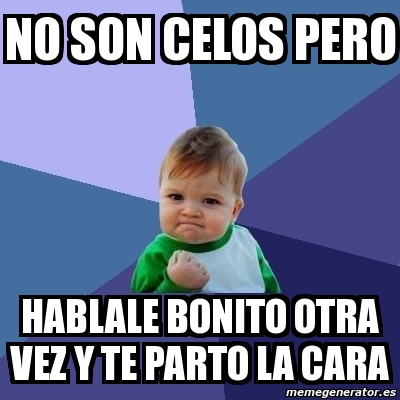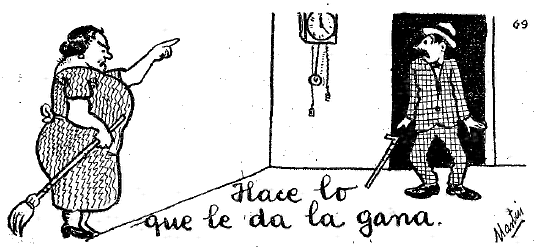
| Языки :: Испанский |
| Аудио |
 |
|
|
193 |
Español |
Spanish |
|
Lección Sesenta y nueve (69) |
||
| Tonterías (1) | Nonsensical stories. | |
| 1 |
Médico y enfermo. — Tiene usted que someterse estrictamente al régimen que yo le prescribo : |
Doctor and patient. — You have, to submit [your H has to s.] .strictly to the diet that I prescribe to you : |
| 2 |
un poquito (2) de lechuga, un tomate crudo, un plátano, dos o tres naranjas... Estrictamente, ¿lo ha entendido usted bien? |
a tiny bit of lettuce, a raw tomato, a banana, 2 or 3 oranges... Strictly... have you understood [it] ? |
| 3 | Sí, doctor, tomaré a diario todo lo que me dice, después de las comidas (3). | Yes doctor, I shall take daily all that you tell me, after the meals! |
| 4 |
¡Qué postín! — Fulano ha estrenado un traje nuevo. — ¡Qué elegante! le dicen los amigos (4). |
What elegance! — What's his name has worn for the first time a new suit. — How smart! his friends say to him. |
| 5 |
Claro; me viste un sastre inglés. — ¿Inglés? ¡Qué postín! |
Of course; an English tailor makes my clothes [dresses me]. — English! What elegance! |
| 6 | Es inglés porque no puede cobrar la factura. | He is English because he cannot make himself paid [cash the bill]. |
| 7 |
(En español se llama familiarmente « inglés » a un acreedor que pide sin éxito el pago de una deuda (5).) |
In Spanish they call familiarly "Englishman" [at] a creditor who vainly claims the payment of a debt. |
| 8 |
Un medio seguro. — ¿Qué haces tú para librarte de los que te fastidian? — Les pido dinero. |
A sure way. — What do you do to get rid [liberate yourself] of those who bother you? — I ask them money. |
| 9 |
Mal sistema. Yo les presto una pequeña cantidad, y ya no vuelvo a verlos (6). |
A bad system. I lend them a small sum [quantity], and I never see them again. |
| EJERCICIOS | EXERCISE : | |
| 1 |
Cantar Me preguntó un amigo lo que eran celos; no sabe el bien que tiene con no saberlo. De buena gana trocaría mi ciencia por su ignorancia. |
A friend asked me — what jealousy was — he knows not the happiness he has — not to know it — Willingly [of good will] — would I barter my knowledge (science) — for his ignorance. |
| NOTES. | |
| 1 |
Tonto, stupid, foolish; tontería, silliness, nonsense. |
| 2 | Poquito : dimin. of poco; c becomes qu to preserve the sound k before the ending ito. |
| 3 |
A diario, or diariamente = todos los días, cada día.
— La comida, dinner, or generally the meal, food. |
| 4 |
Darse postín, to cut a dash, put it on, show off. — ¡Qué postín se da!, "What showing off!" — Fulano : What's his name, Thingum, etc... |
| 5 |
Preguntar is to ask (for information); pedir is to ask (to receive). Pedir is irregular, e changing into i under the stress. Yo pido, usted pide, I, you ask; yo pediré, Vd. pedirá, I shall, you will ask; yo he pedido, I have asked. |
|
— Volver a often means ... again (preceded by the verb).
Espero que volveré a leer esta novela : I hope that I shall read again this novel. — Vuelvo a empezar : I begin (over) again; sometimes, to resume : No volveré a trabajar hoy, I shall not resume working to-day. |
|
|
De buena gana, de mala gana : Willingly, unwillingly. Hago lo que me da la gana [I do what my will (fancy) gives me] : I do what I please. |
